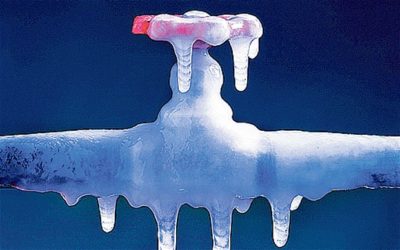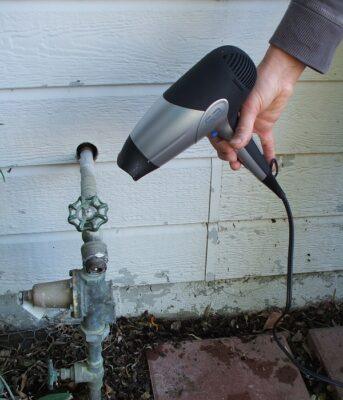One of the biggest issues during winter are water pipes freezing and possibly bursting. Frozen pipes can be a serious problem if they do burst and — depending on the damage — can cost quite a bit to fix. Not to mention it creates a mess and leaves you without running water.
If you are new to an area where frozen pipes are an issue, keep reading.
Obviously, the best way of avoiding frozen water pipes is learning what to do to prevent it from happening in the first place. It doesn’t take much effort to insulate and prepare waterlines for freezing temps.
Here are a few ways you can prevent frozen pipes:
1. Insulate Water Pipes Whenever Possible:
One major step in preventing frozen pipes is to ensure your pipes have some type of insulation. You can purchase foam pipe insulation covers from any hardware store. In a pinch you can also wrap old blankets or even newspaper around the pipes. As an added bonus, insulating your pipes properly will also help cut energy costs for heating water overall.
2. Disconnect All Outside Hoses and Water Lines:
This is especially important for people who live in a country setting and have multiple sources of water around their property. Generally, you aren’t going to be using very many hoses during winter, especially if you switch to water buckets for livestock. Shut off outside water lines that won’t be used until spring. Don’t forget to empty out the hoses as well.
Harness The Power Of The Sun When The Electricity Goes Out…
Also, even if you don’t have outside water lines to worry about, at least know how to shut off the water line in your home. This will be important if a pipe does burst in your home.
3. Keep House Warm Even If You’re Away:
It is usually recommended to drop your house’s temp if you’re away for the holidays during winter. Doing so helps your electric bill but can spell disaster for areas that freeze. The last thing you want is for your pipes to freeze and possibly burst when you aren’t even home to deal with it. Try to keep your house at a minimum of 68 F when you are away.
4. Keep Cupboards Open for Air Circulation:
Another tip that works when you are home or away is keeping open bathroom and kitchen cupboards if possible. Doing this will help warm air in your home reach the pipes easier.
5. Use a Space Heater for Very Cold Winters:
If you’ve had past issues with freezing pipes or recently moved to an area that gets really cold, have a space heater or two on hand as a preventative measure. You probably won’t have to run the heater the entire winter but rather use it on very cold days. It is also important to have an extra space heater on hand if pipes do freeze, as you’ll see below.
6. Let Faucets Drip:
This seems odd but works very well. It is more difficult for pipes to freeze if the water is moving, even if slowly. At night or on extremely cold days turn on the faucet just until it begins dripping water. Aside from preventing frozen pipes it also will alert you if pipes are starting to freeze.
What to Do When Pipes Do Freeze
If your pipes are already frozen, don’t panic. You will need to carefully thaw them out and act quickly to prevent a burst line.
Turn On Space Heaters:
Use a space heater under your house if possible or aim the space heater as close as possible through the wall. If you don’t have a space heater or the freeze is in a small area, use a hair dryer. Of course, for safety reasons, do not use anything electric carelessly if there is water on the ground.
Turn On Faucet:
When thawing frozen pipes you will want to start as close to the faucet as possible. Be sure that when you do this you turn on the faucet a bit so the melted water can escape from the pipe. It is easiest if you have someone help you with this. Also, turning on the hot water will create steam which will further help defrost pipes.
It generally isn’t difficult to thaw frozen pipes; just use caution and a safe heat source.
As a final tip, sometimes you know a pipe is frozen but you can’t find where the ice is. A quick way of finding the block is to insert a garden hose through the pipe until it stops. Often, where it stops is where there is ice. For smaller pipes you can try unfolding a wire coat hanger and using that.
How to Deal With Burst Water Pipes
If you do have a burst line, follow these steps.
- Immediately turn off your main water line.
- Use caution when assessing the damage, especially if there is water on the ground and electrical devices, sockets or wires nearby.
- Locate your burst pipe and decide whether you need a plumber or have the skill to fix it yourself.
If you have zero experience with plumbing or at all doubt your capability, call a plumber immediately. It is really recommended that anyone living in a rural area should have at least basic knowledge of plumbing and how to fix a burst pipe (at least temporarily) by yourself. If you rely solely on a plumber for help, it could take a long time for him or her to reach your home.
Thankfully, there are kits on the market that allow you to temporarily fix a broken pipe until you can get professional help. It would be wise to have a few of these kits on hand at all times.
How do you deal with frozen water pipes in your area? Feel free to share any tips and tricks in the comment section below, as well as any stories that may help others.




























